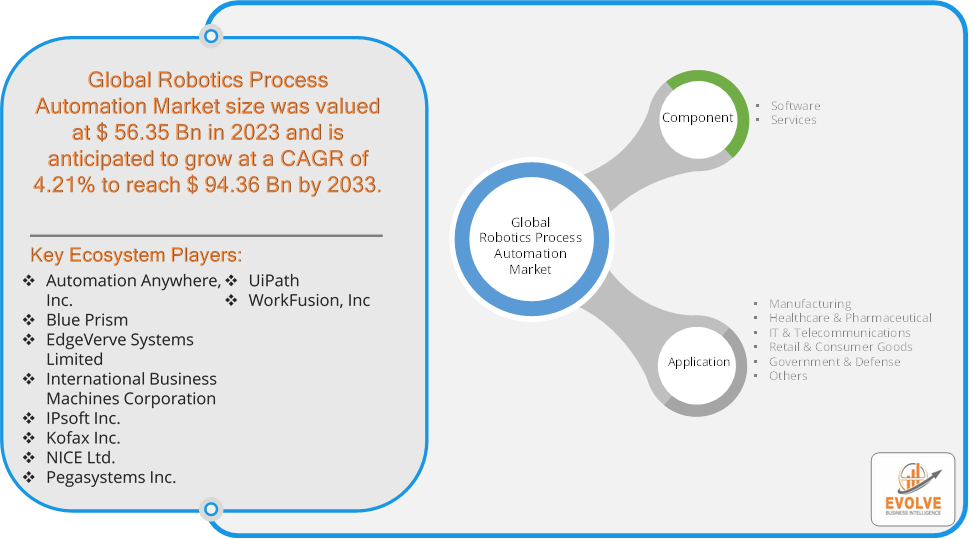Evolve Business Intelligence has published a research report on the Global Robotics Process Automation Market, 2023–2033. The global Robotics Process Automation Market is projected to exhibit a CAGR of around 4.21% during the forecast period of 2023 to 2033.
Evolve Business Intelligence has recognized the following companies as the key players in the global Robotics Process Automation Market: Automation Anywhere Inc., Blue Prism, EdgeVerve Systems Limited, International Business Machines Corporation, IPsoft Inc., Kofax Inc., NICE Ltd., Pegasystems Inc., UiPath and WorkFusion Inc.
 More Information: https://evolvebi.com/report/robotic-process-automation-market-analysis/
More Information: https://evolvebi.com/report/robotic-process-automation-market-analysis/
Market Highlights
The Global Robotics Process Automation Market is projected to be valued at USD 94.36 Billion by 2033, recording a CAGR of around 4.21% during the forecast period. The Robotics Process Automation (RPA) Market refers to the industry segment that focuses on the use of software robots or “bots” to automate repetitive, rule-based tasks and business processes. RPA technology enables organizations to streamline operations, reduce errors, and improve efficiency by mimicking human interactions with digital systems.
The RPA market continues to expand as organizations recognize the benefits of automation and seek to leverage technology to optimize their business processes.
The COVID-19 pandemic had a significant impact on the Robotics Process Automation (RPA) Market. The pandemic accelerated the adoption of digital technologies, including RPA, as organizations sought to adapt to remote work and ensure business continuity. With disruptions in workforce availability and an increased need for efficiency, companies turned to RPA to automate routine tasks and reduce dependence on human labour. The pandemic highlighted new use cases for RPA, such as handling increased volumes of customer queries, managing remote onboarding processes, and supporting healthcare systems. The trend toward automation is expected to continue as businesses recognize the benefits of RPA in enhancing operational resilience and agility. The pandemic accelerated innovation in RPA, including greater integration with artificial intelligence (AI) and machine learning (ML) to handle more complex tasks and provide advanced analytics.
Segmental Analysis
The global Robotics Process Automation Market has been segmented based on Component and Application.
Based on Component, the Robotics Process Automation Market is segmented into Software and Services. The Software segment is anticipated to dominate the market.
Based on Application, the global Robotics Process Automation Market has been divided into Manufacturing, Healthcare & Pharmaceutical, IT & Telecommunications, Retail & Consumer Goods, Government & Defense and Others. The IT & Telecommunications segment is anticipated to dominate the market.
More Information: https://evolvebi.com/report/robotic-process-automation-market-analysis/
Regional Analysis
The Robotics Process Automation Market is divided into five regions: North America, Europe, Asia-Pacific, South America, and the Middle East, & Africa. North America, particularly the United States and Canada, is a leading region in RPA adoption due to advanced technological infrastructure, high levels of digital transformation, and significant investments in automation. The region is a hub for innovation and development in RPA technologies, with many leading RPA vendors and solution providers based there. Europe is experiencing increased adoption of RPA, particularly in countries like the United Kingdom, Germany, and France. The region is focused on improving operational efficiency and regulatory compliance. The General Data Protection Regulation (GDPR) and other regulatory frameworks influence RPA implementation, ensuring that automation solutions comply with data protection and privacy standards. The Asia-Pacific region is witnessing rapid growth in RPA adoption, driven by emerging economies such as India, China, and Southeast Asian countries. Factors include a growing emphasis on digital transformation and cost optimization. India and China are major markets due to their large-scale industries and the increasing need for automation in sectors such as banking, telecom, and IT services. Latin America is an emerging market for RPA, with growing interest in automation driven by the need to enhance operational efficiency and reduce costs. Brazil, Mexico, and Argentina are leading the adoption of RPA in the region, focusing on sectors such as finance, healthcare, and retail. The Middle East and Africa are gradually adopting RPA, with a focus on sectors like banking, telecommunications, and government services. The region offers opportunities for RPA growth due to increasing investments in digital transformation and modernization of business processes.